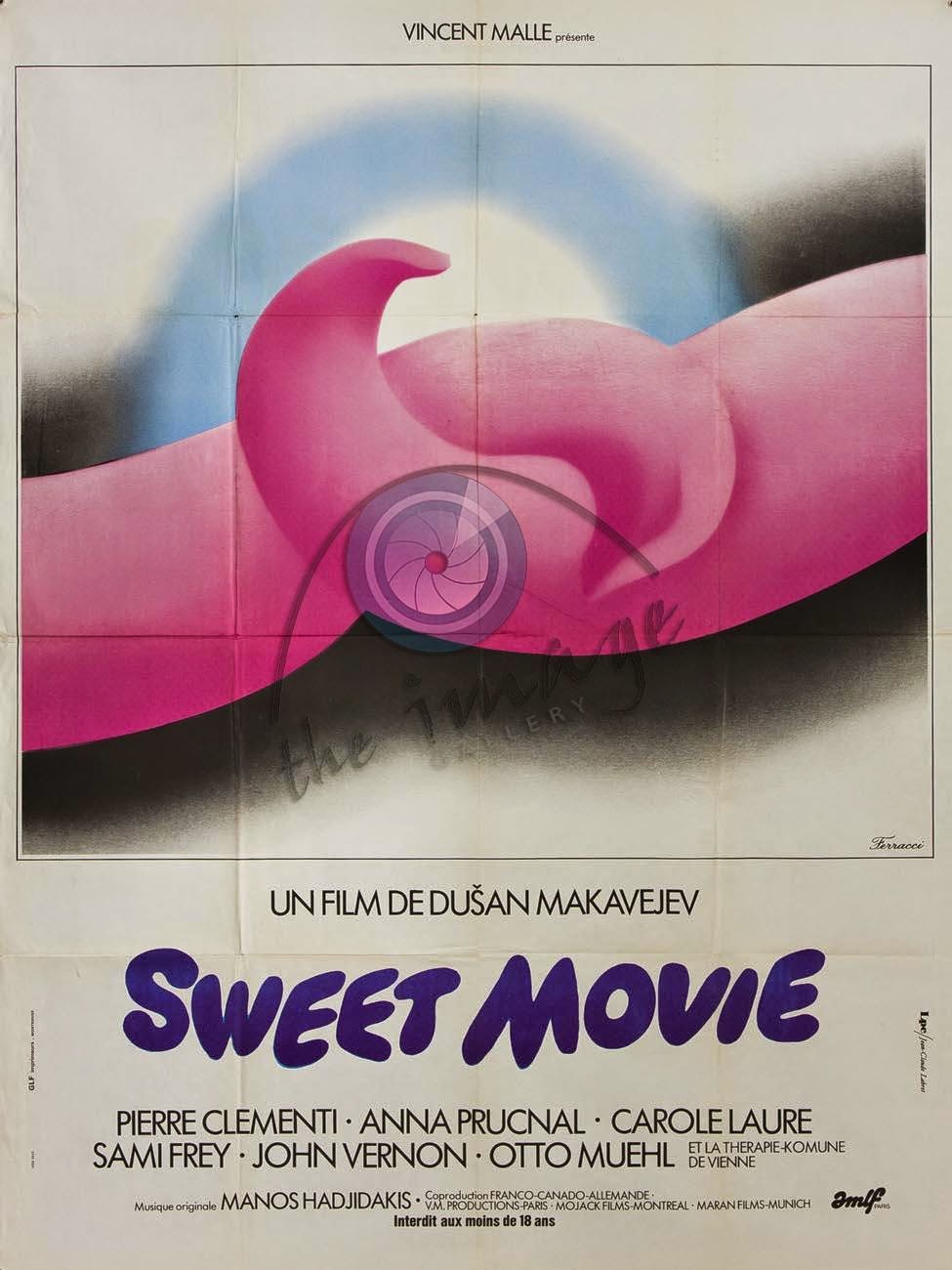How do you start to describe Dusan Makavejev’s 1974
avant-garde art house comedy drama Sweet Movie? The simplest way would
be to say that the movie concerns two very different women, a Canadian beauty
queen known as Miss World 1984, who represents the destructive force of American
consumerism, and Anna Planeto a captain aboard a ship laden with sweets and
sugar who represents revolution, but that would be too simplistic. A better
description could probable be an anarchic look at sexual repression, communism
and economics?
The film ‘is
carnivalesque with vengeance, aimed at overthrowing every arbitrary rule,
regulation and tradition it can find, including the conventions of cinema
itself’[1]
and Makavejev succeeds with plenty to spare! Since its release the movie has
been described as uncouth, uncivilised, and offensive and has been banned, or
severely cut in many countries. A film guaranteed to course lively debate
whenever and wherever it’s shown.
Makavejev was forced to move from Yugoslavia to Europe following
his political satire WR: Mysteries of the
Organism (1971) to allow him to continue to make films, but still finance,
even in Europe, was difficult to come by, but he managed to raise the funding
for Sweet Movie from Canada, the
Netherlands and France as well as Sweden and West Germany.
There were even more serious consequences for Polish actress
Anna Prucnal who plays Captain Anna. The Polish authorities deemed the film to
be pornographic and anti-Communist and took away the actresses passport exiling
her from her homeland for seven years, not even granting her a visa to visit
the country when her mother passed away!
 |
| For chocolate lovers only! |
The narrative for Sweet
Movie, which like WR: is
allegedly based on the theories of sexually liberation put forward by
psychologist Wilhelm Reich, starts with the Crazy Daisy Show introduced by the
Director General of the Chastity Belt Foundation (Jane Mallet) who is running a
competition to find the prettiest virgin for Miss World 1984. Her prize is
marriage to Mr Dollars (John Vernon) the world’s wealthiest man. But when the
new bride (Carole Laure) discovers that her husband has a gold plated penis and
a ‘morbid fear of sex related disease’ she rejects him. In response the family
bodyguard takes her to the giant milk bottle on the roof of Mr Dollars milk
emporium, sexually humiliates her, packs her in a suitcase and sends her to
Paris. Waking up on the Eiffel Tower she has intercourse with a Latin singer,
ending up in hospital when the pair cannot be separated! Miss World 1984 goes
on to join the Therapy Commune of Otto Muehi who performs exaggerated bodily functions.
She takes part in a meal, which includes vomiting the food you have just eaten followed
by one of its members performing regression therapy, a rebirth experience where
he cries, urinates and defecates over himself. The group then clean, powder and
pamper him. We finally see Miss World 1984 take part in the filming of an
advert for chocolate in which she totally immerses her naked self.
Meanwhile in Amsterdam Captain Anna’s boat Survival, with
the enormous head of Karl Marx on its bow, sails on the canals of the great
city with its cargo of sweets and sugar. She picks up a young sailor from the
Potemkin (Pierre Clementi) who professes his love, but she warns him that she
kills all her lovers, excepting this condition he moves onto the boat and the
pair begin their lovemaking on a large suspended vat full of sugar. Also
invited onto the boat are a group of pre-pubescent boys who she seduces. (It’s
this scene that got the film banned from the UK)
Is there life after birth? A fantasy sure enough but one
that’s rich in political references, not always recognised by viewers from the
west admittedly, and phallic symbols, mainly penises including the Eiffel Tower
– intellectual cinema about ideas and multi-layered references. The film is
interwoven with documentary clips including some disturbing footage from a
German film showing the victim’s of the Katyn Massacre when the Russian Army
executed Officers from the Polish army, a brave move by the director for 1974 considering
we were still in the midst of the cold war.
Dusan Makavejev was part of the Yugoslav Black Wave a
movement of the 1960’s and early 1970’s that was known for its non-traditional
approach to filmmaking, which included black humour and a critical examination
of the Yugoslavian society. Director of photography is Pierre Lhomme.
The film's music is composed by Greek composer Manos
Hadjidakis.





No comments:
Post a Comment